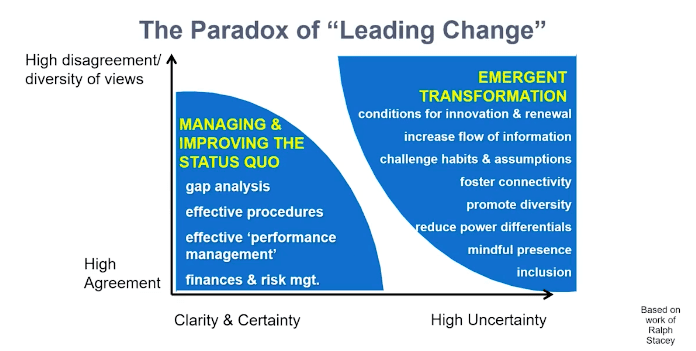How can organizations lead positive change toward a World that Works for All? How to work in a Post-Covid World that’s Volatile, Uncertain, Complex, and Ambiguous? Ronald Fry, appreciative inquiry developer with David Cooperrider, shared his answers at The Great Leadership Reset conference.
In VUCA times, leading change is even more challenging than it used to be. There’s both high uncertainty and high disagreement about actions we can take. We see gaps between different perspectives widen everywhere.
As humans, we seek to reduce uncertainty and mistakes but that only works when you’re managing and improving the status quo. Then, you can develop command and control and aim for efficiency. But this isn’t doable in a VUCA world with emergent transformation.
Everyone has lots of information and different ideas on what is the best next step. In VUCA times you cannot improve the status quo, but you have to focus on emergent transformation. That entails fostering conditions for innovation, challenging habits and assumptions, fostering connectivity, promoting diversity and inclusion.
Conversation is the work
Fry explains: “Covid pulled us into transformation. That means that organizing is a complex responsive process. Organizations are human beings in an ongoing process of human interaction, affecting and affected by their environment. They are not in control, but co-creating. The core process of organizing in VUCA circumstances is: everything happens through conversation.”
“Leaders need to facilitate and be flexible. Conversation is not a distraction from work, it is a big part of the work. Making sense of what is happening and emerging – and collectively deciding on actions. Order emerges out of chaos. We experience stability and instability at the same time.”
According to Fry, the best response to the VUCA chaos is not traditional deficit management (focusing on problems and fixing them) but appreciative inquiry (focusing on the current best and creating even better outcomes based on strengths).
Says Fry: “We have to take conversations more seriously. This calls for a reset of our mindset. Some helpful principles for organizing are:
- Real change arises through working with the informal processes more than through formal change management.
- Control is an illusion – accept unpredictability – this means giving up the need to be right.
- Conversation is the only game in town.
- There is no such thing as objectivity, so no one person is ever completely right or wrong.
- Legislating (procedure-izing) for every eventuality kills the capacity to innovate.
- Unintended consequences (mistakes) are normal and inevitable.”
Connect from strengths, through stories, and for purpose
Meaning arises out of what people co-create and everything happens then. The advice is to create spaces for conversations that connect from strengths, connect through stories and connect for purpose. If you’re a regular reader of my posts, you might recognize features of a positive culture in Fry’s advice to “organize for emergence”. Focusing on what is working well and on strengths leads to high engagement, positive emotions, and positive future visions. It’s what positive leadership focuses on, and Appreciative Inquiry is a great tool in a positive culture.
Creating a positive culture entails developing high-quality relations that embrace compassion and kindness. When we are trusted and treated kindly, our brains produce oxytocin. That stimulates cooperation – it becomes a positive cycle of support and collaboration.
What do we choose to ask – and do?
Connecting for purpose is also crucial – if we want to bring about positive change in the world. Fry shares a quote by Willis Harman: “Business, the motor of our society, has the opportunity to be the new creative force on the planet, a force which could contribute to the well-being of many… the modern corporation is as adaptable an organizational form as has ever been invented, so that in a time of fundamental change it may be expected to be on the cutting edge”.
And: “Let us choose to unite the strengths of markets with the power of universal ideals… Let us choose to reconcile the creative forces of private entrepreneurship with the needs of the disadvantaged and the requirements of future generations”, Kofi Annan, UN Secretary-General, said.
What are we going to choose to do? Fry and others started the world inquiry, based on appreciative inquiry and positive organizational scholarship. The key question is: How can institutions magnify and refract the prism of human strengths?
Fry explains: “If you want to change something, begin by changing the way you talk about it. We move in the direction of the questions we ask, and we use stories to connect. So, for instance, don’t ask about low morale, ask about enthusiasm. Find stories, see what you can learn from those.
We began with our students – they interviewed and looked for stories about innovations that could improve the world. After 9 years we had 1500 interviews. Then we started aim2flourish.com. It is now a story bank full of ideas and innovations around the 17 UN global goals and helps businesses prosper.
It is a win-win situation. Instead of focusing on themselves, people in organizations are creating good at a larger level. That activates engagement, creativity, and more. That helps organizations to improve internally. It starts with turning the company outward-looking for how you can be of service. Then, you can help the world and your own company.”
Through the project, Ronald Fry learned: “There is nothing that brings out the best in human enterprise faster, more consistently, or more powerfully than calling the whole organization to design sustainability solutions to humanity’s greatest challenges.”
We offer positivity research and practices to develop resilience and collaboration skills. This might help to face the current challenges.
That’s why you can enroll in the online Positive Culture Academy. Join today!
We offer The Positive Culture Book at a reduced price.
Check out the next online Culture Change Leadership workshop in 2022! Registration is open – places are limited to guarantee interaction and quality.
